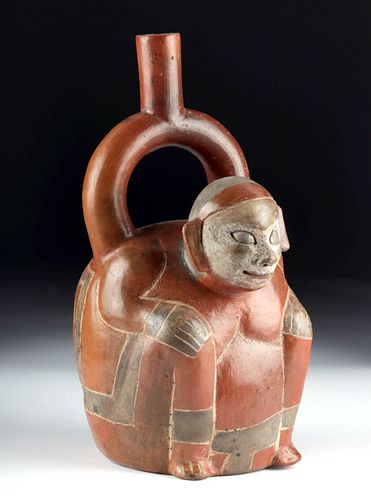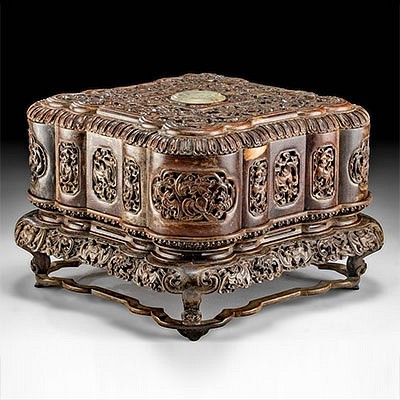Chavin Tembladera Spouted Vessel Transforming Shaman
Lot 72
About Seller
Artemis Gallery
686 S Taylor Ave, Ste 106
Louisville, CO 80027
United States
Selling antiquities, ancient and ethnographic art online since 1993, Artemis Gallery specializes in Classical Antiquities (Egyptian, Greek, Roman, Near Eastern), Asian, Pre-Columbian, African / Tribal / Oceanographic art. Our extensive inventory includes pottery, stone, metal, wood, glass and textil...Read more
Categories
Estimate:
$8,000 - $12,000
Absentee vs Live bid
Two ways to bid:
- Leave a max absentee bid and the platform will bid on your behalf up to your maximum bid during the live auction.
- Bid live during the auction and your bids will be submitted real-time to the auctioneer.
Bid Increments
| Price | Bid Increment |
|---|---|
| $0 | $25 |
| $300 | $50 |
| $1,000 | $100 |
| $2,000 | $250 |
| $5,000 | $500 |
| $10,000 | $1,000 |
| $20,000 | $2,500 |
| $50,000 | $5,000 |
| $100,000 | $10,000 |
| $200,000 | $20,000 |
About Auction
By Artemis Gallery
Apr 8, 2021
Set Reminder
2021-04-08 10:00:00
2021-04-08 10:00:00
America/New_York
Bidsquare
Bidsquare : Fine Antiquities | Asian | Ethnographic Art
https://www.bidsquare.com/auctions/artemis-gallery/fine-antiquities-asian-ethnographic-art-6770
Features classical antiquities, ancient and ethnographic art from cultures encompassing the globe. Egyptian, Greek, Roman, Etruscan, Near Eastern, Asian, Pre-Columbian, Native American, African / Tribal, Oceanic, Spanish Colonial, Russian, Fine Art, so much more! All legally acquired, legal to sell. Artemis Gallery info@artemisgallery.com
Features classical antiquities, ancient and ethnographic art from cultures encompassing the globe. Egyptian, Greek, Roman, Etruscan, Near Eastern, Asian, Pre-Columbian, Native American, African / Tribal, Oceanic, Spanish Colonial, Russian, Fine Art, so much more! All legally acquired, legal to sell. Artemis Gallery info@artemisgallery.com
- Lot Description
Pre-Columbian, North Coast Peru, from Tembladera in the Jequetepeque Valley, ca. 1200 to 500 BCE. A rare tri-colored stirrup vessel depicting a shaman engaged in a trance-like state, most likely under the influence of the hallucinogenic effects of the San Pedro cactus whose branches contain a psychoactive substance that was used for traditional medicine and rituals. The shaman's face is almost simian suggesting that the he may be undergoing a transformation. The figure sits with both hands upon raised knees, a pronounced hunchback (this physiognomic deformity was believed to be a sign that the individual was touched or chosen by the deities), and stares straight ahead with his white face, this color symbolic of the afterlife. A stirrup rises from his back with a tall cylindrical spout. The attractive surface of the piece is finished in red, brown, and white and skillfully stone polished, with the exception of the matte white face. Size: 5.625" W x 11.375" H (14.3 cm x 28.9 cm)
Chavin polychrome stirrups are extremely rare and are found only on the Jequetepeque River on its estuary called Cayalti, or in the Amazonas part of the Maranon River. The Chavin people lived in the northern Highland Andes, and their capital, Chavin de Huantar, is an UNESCO World Heritage Site. The artwork of Chavin represents the first widespread style in the Andes.
Provenance: private Hawaii, USA collection; ex-private Hans Juergen Westermann collection, Germany, acquired from 1950 to 1960s
All items legal to buy/sell under U.S. Statute covering cultural patrimony Code 2600, CHAPTER 14, and are guaranteed to be as described or your money back.
A Certificate of Authenticity will accompany all winning bids.
We ship worldwide and handle all shipping in-house for your convenience.
#136621Repaired from about half a dozen pieces. Slight surface wear with a few scuffs to the stirrup and fading to pigment on face. Nice manganese blooms grace the surface. Fine burnished surface.Condition
- Shipping Info
-
All shipping is handled in-house for your convenience. Your invoice from Artemis Gallery will include shipping calculation instructions. If in doubt, please inquire BEFORE bidding for estimated shipping costs for individual items.
-
- Buyer's Premium



 EUR
EUR CAD
CAD AUD
AUD GBP
GBP MXN
MXN HKD
HKD CNY
CNY MYR
MYR SEK
SEK SGD
SGD CHF
CHF THB
THB
















